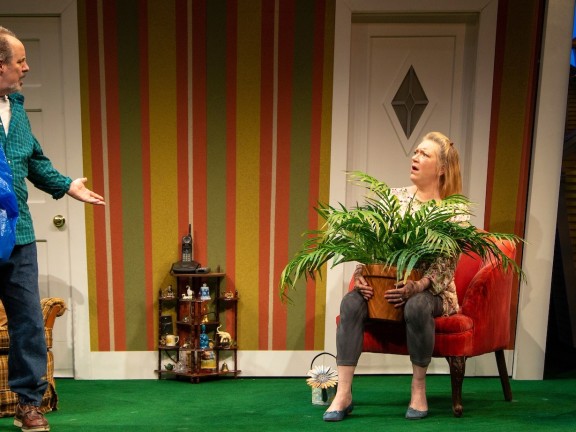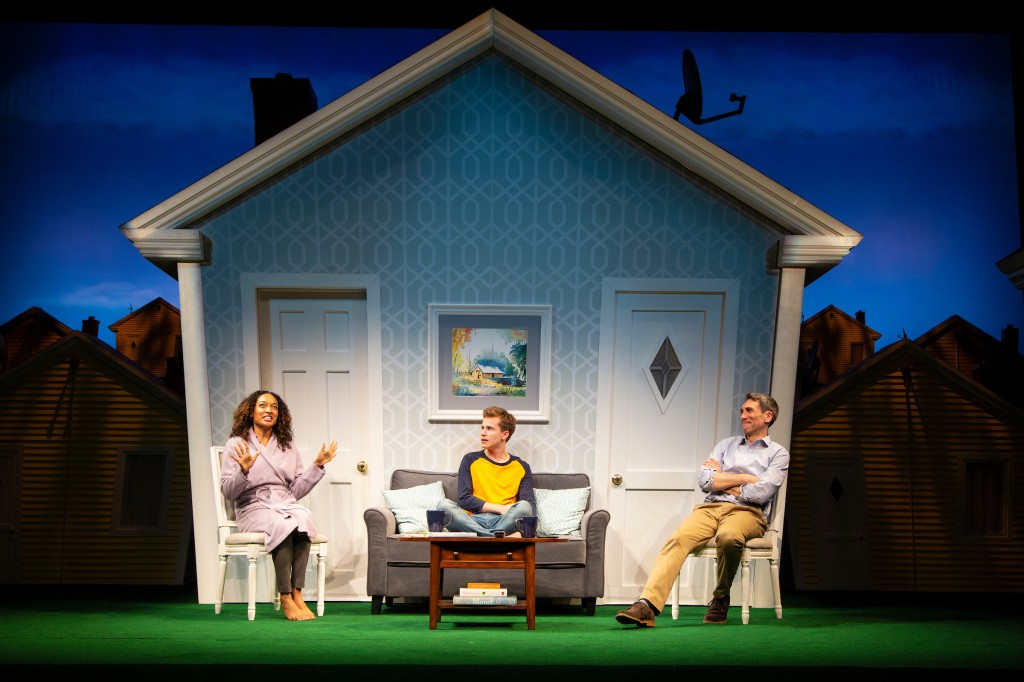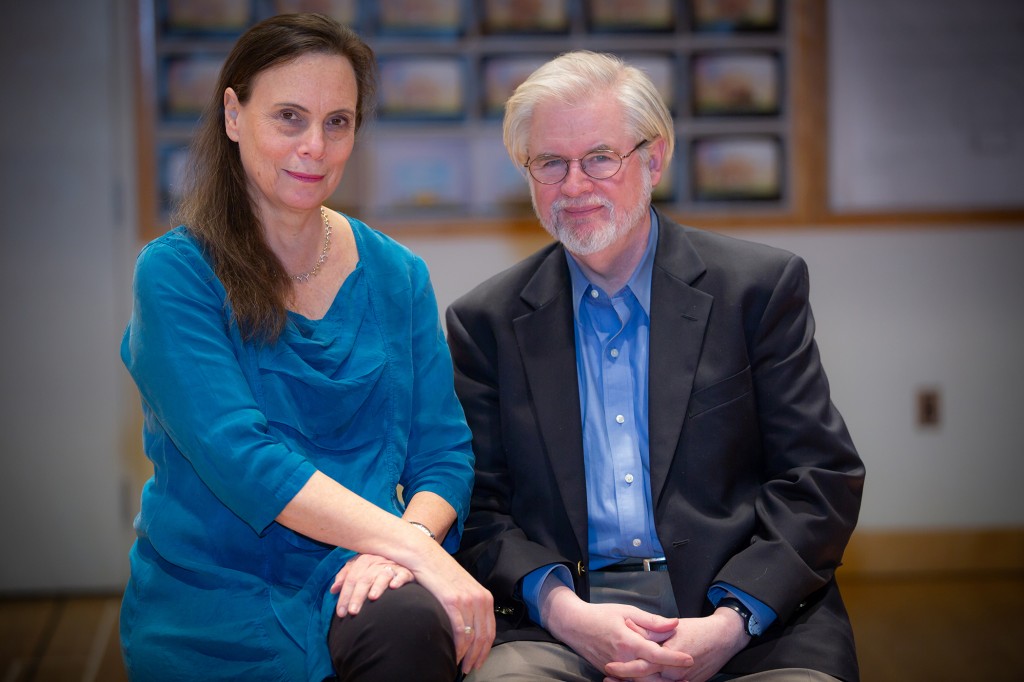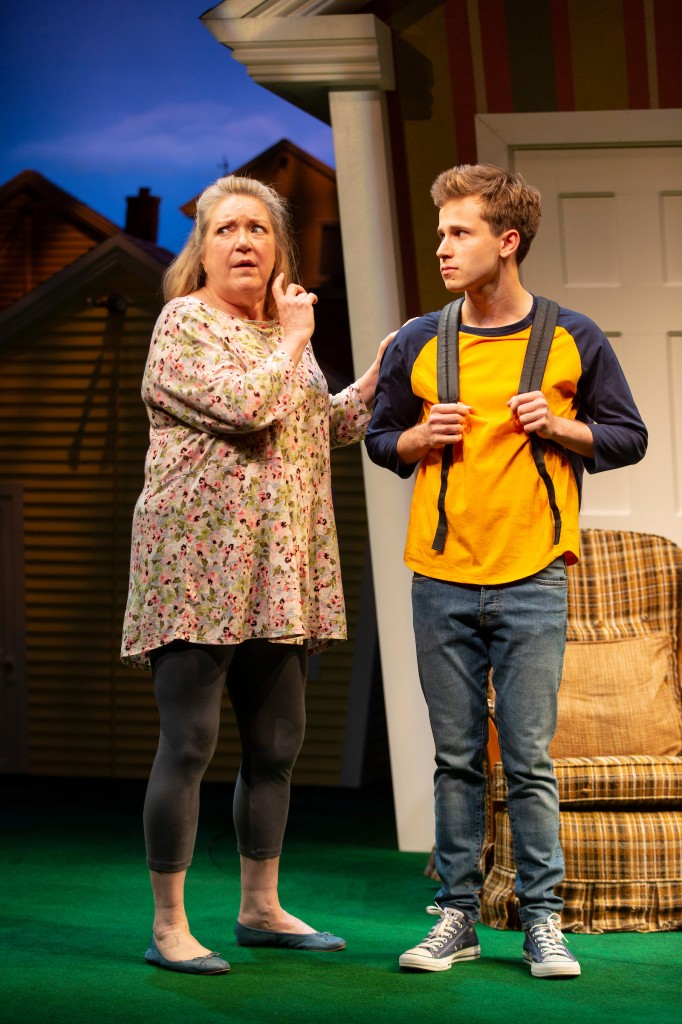Good Friends Bring "Turning Off the Morning News" to the Stage


Rachel Nicks, Nicholas Podany and Robert Sella. Photo by T. Charles Erickson
Mark Twain once observed, “The secret source of humor itself is not joy but sorrow.”
One of America’s funniest playwrights, Christopher Durang, is proof. His plays are absurd, comical, and, almost always, very dark.
“Chris is able to take on disturbing questions and issues that in another writer’s hands would take the form of tragedy and spin it into comedy,” says Emily Mann, who directed Durang’s newest comedy, “Turning Off the Morning News,” now in its final weeks at the McCarter Theatre Center in Princeton.
It’s a play that deals with topics that are so raw – including guns, suicide and domestic abuse – that it comes with a content advisory. Durang developed the play at McCarter, which has become a kind of an artistic home for him. It’s a place where his own specific brand of finding joy in the face of sorrow is given free range.

Director Emily Mann and Playwright Christopher Durang. Photo by Matt Pilsner
Mann and Durang have known each other for a long time. They met while students at Harvard in a playwriting class with the noted playwright and scholar William Alfred. Then a senior, Durang applied, and “to my delight I got in - it was a small seminar. And Emily got in, which, as a freshman, was a big deal!” Both went on to become award-winning playwrights.
After graduation, Durang built a reputation as a writer of outrageous, darkly humorous plays, winning Obie Awards for “Sister Mary Ignatius,” “The Marriage of Bette and Boo” and “Betty's Summer Vacation.” Mann wrote plays described as “theater of testimony,” including the Obie-winning “Still Life”and the Tony-nominated “Having Our Say.”
Mann’s been the Artistic Director of the McCarter Theatre since the 1990-91 season. When Durang moved to nearby Bucks County, Pennsylvania, they reignited their friendship and became professional collaborators as well.
Three of Durang’s plays have been commissioned by the McCarter: “Miss Witherspoon” (2005), “Vanya and Sonia and Masha and Spike” (2012) and now “Turning Off the Morning News.” Famously, “Vanya and Sonia and Masha and Spike” won Durang his first Tony Award in 2013. The Best Play-winner went on to become one of the top 10 most-produced plays in America in the 2015-16 season.
Mann directed “Miss Witherspoon” and now “Turning Off the Morning News,” but McCarter has been involved in a far deeper way than simply presenting finished plays. Durang worked on all of these plays in the McCarter LAB, a year-round creative incubator providing artistic and financial support to artists. In addition, during the LAB’s Artist Retreats, Durang joined other artists at Princeton University’s Palmer House for an intensive two weeks of writing and sharing their works.
“I liked being around the other artists,” he says. “We had rather organized dinners every night, and I liked finding out what they were working on.”
Feedback from trusted colleagues, such as Mann and his fellow LAB artists, has been especially valuable for Durang because of his unique way of working. He often has the first act of a play fully written before even knowing what will happen next.
For “Miss Witherspoon,” he was encouraged to continue because Mann was interested in a play about reincarnation (Miss Witherspoon has committed suicide and is resisting reincarnation). For his next commission, Durang read the first acts of two different unfinished plays, and asked the McCarter to choose one: it became “Vanya and Sonia and Masha and Spike,” a comedy about middle-aged siblings (and a twist on Chekov).
As Durang says about working at the McCarter, “It’s encouraging. Either they’re saying we like this current play that you’re currently working on, or we like your work in general and we’d love you to be writing a play.”

(l-r) Kristine Nielsen, Rachel Nicks, Robert Sella, Nicholas Podany, and Jenn Harris. Photo by T. Charles Erickson
Now, Durang and Mann have put what may be the most pressing public crisis of our time on stage front and center. As anyone who has followed Mann’s career knows, she does not shy from difficult or uncomfortable topics – her own plays have dealt with racism and the Holocaust. Durang’s plays have dealt with controversial topics such as child abuse, Roman Catholicism and homosexuality. With “Turning Off the Morning News,” they bring gun violence to the stage.
“As a child in the 1950s and a teen in the ‘60s, I went to the movies and the malls and to schools,” says Durang, “and I never had to worry about someone killing me in those places. In the 2000s, the killings started to happen.”
As we turn on our radios and computers, we hear of new shootings with numbing regularity. Statistics show the United States as having 57 times more school shootings in the last nine years than all other industrialized countries combined. By some measures, it is now more dangerous to be a student in America than to be a soldier in a war zone.
The violence in our own neighborhoods is literally next door in “Turning Off the Morning News.” It’s perhaps an unlikely topic for a comedy, but that’s Chris Durang. How else can we take it? It’s laughter because when all else fails, it’s what we have. Joy in the face of sorrow.
“Turning Off the Morning News” will be at the McCarter’s Berlind Theatre through June 3, 2018.

